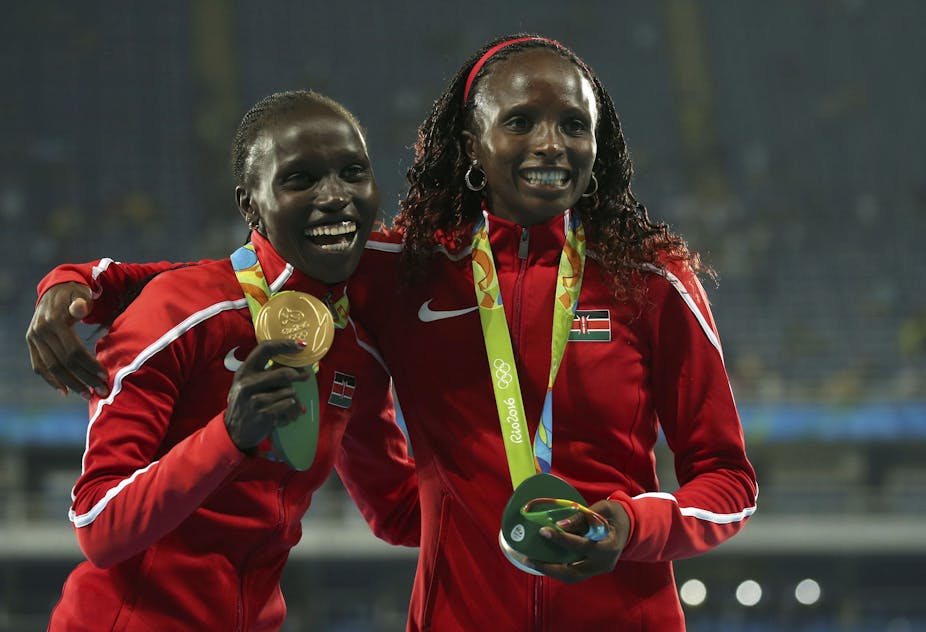Kenya topped the Africa medals table at the Rio Olympics last year. But this outstanding performance was overshadowed by the incompetence and corruption of its team management. The problems are so deep-rooted that the International Olympic Committee recently threatened to suspend the country after national affiliate officials voted against reform. Wycliffe W. Njororai Simiyu, explains the background
What ails the Kenya national Olympic committee?
The National Olympic Committee of Kenya’s inherent problems are not new. What’s new is the alarming decline, which burst into view during the Rio Olympics last year. Numerous instances of gross mismanagement came to the surface during the games involving accreditation, accommodation, travel and allowances. Corruption was also evident in the disappearance of official team kit and theft of cash.
What we are seeing today is a long-drawn fallout from Rio which set in with the arrest of several senior Olympic team officials soon after the games. These officials now face charges of using their positions to procure fraudulently Team Kenya kit provided under contract and stealing cash and uniforms meant for athletes.
Not even Kenyan athletes’sterling performances on the track were enough to mask the hurdles they had to overcome. The athletes had to endure haphazard travel arrangements, inadequate training gear and questionable allocation of places in the Olympic Village.
On top of this, a Kenyan official was ejected from the games on doping-related bribery allegations. And a senior athletics coach, who arrived in Rio unaccredited, was expelled from the games for using an athlete’s pass.
What is at the root of the current crisis?
The crisis in Kenya’s Olympic committee’s stems from the questionable integrity of its long-serving office holders. The officials seem to have perfected the art of misusing the resources to the detriment of sport and the athletes.
Unfortunately, change will not come easily. The current constitution gives incumbent officials disproportionate power in any general assembly vote - which they often deploy as a bloc to retain their positions.
But it’s clear that IOC wants to see change in the governance structure of the Kenyan committee. It would like to see a new constitution adopted that would bar incumbent officials from casting their vote at the general assemblies. This would change the current arrangement where the incumbents are virtually guaranteed retaining their seats during elections.
There have been reports that Kenya could be suspended from the Olympic movement. What’s the background.
The national outrage that greeted the Rio 2016 scandal led the sports minister to dissolve the national Olympic committee. He also set up a team to investigate the Rio affair. The IOC, which frowns on any official interference, threatened to suspend Kenya.
This dissolution was popular at the time. A cabinet secretary accused Olympic officials of “living large in Brazil” and being “a law unto themselves”. But a judge quickly overturned the government’s action after the national Olympic committee head Kipchoge Keino took the matter to court.
As a compromise, a tripartite group was convened, bringing together the national committee, the sports minister and the IOC. Its aim was to improve governance through a new constitution that would allow for change in the membership of the national committee. As things stand, the incumbent officials outnumber the rest of the delegates.
But because the old constitution was used to convene the special general meeting called to ratify the new regulations, current officials used their superior numbers to defeat it.
One of the key consequences of not passing the new constitution has been the swift withholding of funds by the IOC. More sanctions could follow if a new constitution is not put in place.
What would the impact of such a suspension be on Kenyan sport?
A suspension would put Kenya in the company of oil-rich Kuwait, which was sidelined for passing a law that ran counter to the mission of the Olympic movement.
A suspended nation loses money to develop sports programmes and infrastructure. It also loses representation in IOC sanctioned events at the international level. But athletes can participate in events as individuals under the Olympic banner, similar to political refugees.
Is the IOC’s interest in Kenya warranted? Are there other countries on its radar?
I think the push for improved governance in sport is a worldwide phenomenon and not just a Kenyan issue. At the global level, there was worldwide attention when FIFA officials were in the spotlight in 2015. The then powerful FIFA president Sepp Blatter was forced out of office following allegations of bribery, corruption and general mismanagement.
These high profile scandals elicited international outrage and unprecedented action. US law enforcement led the way in arresting FIFA officials that were suspected of engaging in questionable deals.
The Rio fiasco presented the IOC with a good opportunity to intervene and demand action for long-term reform. This was better than responding with a suspension for political interference. The IOC’s collaboration with the government and the national committee to create a more responsive, transparent and responsible organisation is commendable.
And if the stalemate continues, the IOC may suspend Kenya due to a lack of goodwill and desire for change in governance by its own affiliate.

